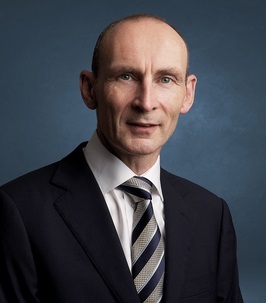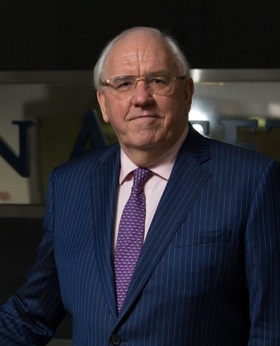In the second and concluding part of an extensive series of interviews, we speak with three high profie financial adviser firms based in the Middle East where all of them reveal how business prospects are shaping up as expat restrictions ease.
These adviser viewpoints form a key section of the in-depth coverage covering adviser viewpoints, interviews and market insights in International Investment's latest Special Report on the Middle East 2021.
Part two below covers the insights of Nigel Green, CEO and Founder, deVere Group; Robert Parker, CEO, Holborn Assets; and Hannah Greenwood, MD, Finsbury Associates.
Nigel Green, CEO and Founder, deVere Group
"THE WAY WE SAVE, INVEST, USE AND MANAGE OUR MONEY HAS CHANGED FOREVER. WE ARE WITNESSING A PERSONAL FINANCE REVOLUTION DRIVEN BY TECH."

How has regulatory change affected your business and advice in the region generally?
I believe that, ultimately, these changes will help shore-up the international advice sector, making it more robust and, therefore, will be good for its long-term future.
Although we're a large and well-resourced organisation, we're also agile and proactive, meaning that we've been able to adapt to evolving regulatory requirements and client expectations.
I expect that the regulatory approach being taken by the UAE will further galvanise its future as a leading international financial hub. The UAE is already poised in this regard thanks to a high proposition of high-net-worth individuals, a dynamic business community, world-class infrastructure, superior communications networks, English as its de-facto business language, and its enviable geographical location and time zone, among other factors.
How has the pandemic impacted on how you conduct your business and advice in the region generally?
DeVere adapted rapidly and decisively when the pandemic hit. We began to work with clients and colleagues around the world via Zoom meetings - and still today a lot of our work is done by video conferencing.
We've found that many of our GCC clients are more willing than ever to have meetings via Zoom. In fact, they seem to prefer it to face-to-face meetings in many cases. The result of this is that we can speak to more clients each day, helping them reach their financial objectives, and our productivity has increased considerably.
Zoom and other technologies have helped us immensely and now, wherever possible, we offer a hybrid system.
We've found that many of our GCC clients are more willing than ever to have meetings via Zoom. In fact, they seem to prefer it to face-to-face meetings in many cases. The result of this is that we can speak to more clients each day, helping them reach their financial objectives, and our productivity has increased considerably.
Zoom and other technologies have helped us immensely and now, wherever possible, we offer a hybrid system where people can either work from our Covid-secure, cutting-edge offices, from home, or a combination of the two.
We've also registered a considerable jump in usage of our fintech apps from existing clients, and a sharp increase in enquiries from potential ones, which underscores that people are becoming more tech-savvy than ever.
Like never before, people are embracing the convenience of immediate, low-cost access to, use and management of their money. As the world moves towards an ever-more digitalised and globalised future - which is increasingly influenced by those who've grown-up with 'on-the go' tech - this phenomenon can only be expected to gain momentum.
The way we save, invest, use and manage our money has changed forever. We are witnessing a personal finance revolution driven by tech.
What are the key investment and advice trends that you have seen emerge this year and that you expect to continue into 2022 (ie ESG, Crypto, Multi Asset etc)?
There are three underlying forces that have been the major investment megatrends of this year and will, in my opinion, be so for the rest of this decade, likely to be worth tens of trillions of dollars.
The first is technology. The digital revolution is taking place right now in a monumental way, with our daily lives become ever more digitalised at a staggering speed. The rapid advancement of digital technologies is already fundamentally changing business models, money (cryptocurrencies), institutions and society as a whole - and this trend is likely to pick up pace further as tech evolves and mass adoption picks up further.
The second megatrend will be environmental, social and governance (ESG) investments. The pandemic has fostered a growing collective awareness and sense of mutual responsibility.
It's been brought into sharp focus that today's public health crisis could be overshadowed by tomorrow's climate crisis. It has demonstrated the importance of having sustainable and diverse supply chains.
It has also underscored that companies with strong corporate governance and good business practice are best-positioned for the future. This has been evidenced by those investments with robust ESG credentials continuing to outperform throughout the bouts of stock market volatility.
The third will be the rollout out of 5G, which will create a global ‘work anywhere' culture and this can be expected to make a significant impact on international financial services.
Is the life assurance industry in the region near finished due to lower margins etc?
Life assurance is part of any sound financial planning strategy and will always be in demand, especially among high-net-worth individuals and/or professionals. And where there is demand, there will be providers ready to meet it. I'm confident the industry in this region is able not only to adapt, but to thrive and grow.
Have issues such as limited movement in the expat world in the region affected business flows? How are things looking re growth, staff retention and expansion and general profitability for your business in Dubai and the rest of the region?
Thanks to the tremendous effort, talent and commitment of our people around the world, we've not only maintained, but increased business inflows.
Also, of course, despite movement restrictions, expats will always need specialist cross-border financial advice. In fact, our clients are becoming ever more engaged as the pandemic has brought home the need for financial security for themselves and their loved ones like never before.
We're continually looking to not only grow our group of companies but look to develop new ones that are tech-driven, future-first entities in order to meet the evolving nature of business and personal finance.
Robert Parker, CEO, Holborn Assets
"COVID-19 HAS CHANGED OUR LIVES AND IT HAS CERTAINLY CHANGED HOW WE ENGAGE WITH OUR CLIENTS AND CONDUCT DAY-TO-DAY BUSINESS"

How has regulatory change affected your business and advice in the region generally?
Regulatory changes are part and parcel of doing business particularly in markets that are growing at a fast pace, a bracket the Middle East certainly falls into. Thankfully Holborn is an international company that already operates in a number of jurisdictions that adhere to high levels of regulation such as the UK, US, HK and SA.
This experience, coupled with the company's scale, has allowed us to smoothly adapt and implement the new regulations without a great deal of disruption to the day-to-day operations.
The reduction in commission has necessitated more innovation, innovations that have improved efficiency right through the chain, from the initial advice to the onboarding through to service that can be seen as a positive and improve the client experience.
However, one consequence of the regulation is that it has drastically changed the commercial viability of certain product lines, namely the promotion and sale of life and CIC insurance to the retail market. The result of which is a reduction in penetration across the sector, a sector one could easily argue needs it the most.
There is no doubt this has created a gap in the market, and we along with our partners are working in the background to find a way to bridge that gap in the near future.
How has the pandemic impacted on how you conduct your business and advice in the region generally?
Covid-19 has changed our lives and it has certainly changed how we engage with our clients and conduct day-to-day business. Holborn has always embraced technology; we have been working tirelessly over the last few years to advance the company's IT infrastructure. As the company has grown, we have of course had cliente relocate to areas in the world where we may not have a physical presence, so we have previously had to find ways to engage with them remotely.
What are the key investment and advice trends that you have seen emerge this year and that you expect to continue into 2022? (ie ESG, Crypto, Multi Asset etc? Is life assurance industry in the region near finished due to lower margins etc).
First and foremost, while we are a financial advisory company, we are very clear that an adviser's expertise should lie in financial structure and instruments. If you want to offer the very best levels of service across all spectrums then financial markets and investments, while connected, should be considered a separate expertise.
Our advisers are, of course, knowledgeable, well informed and educated about changes in the investment world and market trends but we must also continually refer back to the original goals and objectives of the client, and not get too heavily influenced by market trends when we are by and large working to long-term objectives within a given risk profile.
We have seen a considerable rise in the interest in Cryptocurrencies but we have yet to make the move into offering advice on investments. However, that is not to say we will not in the future.
In fact a recent survey of the Middle East respondents Holborn carried out in conjunction with You Gov (click here to see survey) gave a clear indication of the need for more education despite robust demand around Cryptocurrencies as a precursor before making portfolio allocations.
Clients are, of course, more aware of the ESG principles, certainly among our millennial clients, and I expect this will certainly be the case from our clients of the future. We are watching both spaces with keen interest and we continue to work and consult with our strategic partners to adhere to the ESG principles, we endeavour to offer the best investment and asset management available in the marketplace, and right now we are confident we offer that.
Have issues such as limited movement in expat world in the region affected business flows? How are things looking re growth, staff retention and expansion and general profitability for your business in Dubai and the rest of the region?
Limited movement and other restrictions have forced us to work smarter and harder. We have embraced digitisation, which has made us more efficient. We have been very proud of the way Holborn employees have adapted to the new normal and continue to deliver high-level advice and service to our clients across the world.
Staff retention, growth and expansion in the Middle East remains on track despite the uncertainty and we have seen a noticeable increase in job enquiries as experienced professionals look for new opportunities within a larger organisation.
Smaller operations will no doubt face difficult challenges in the years ahead and we expect to see further consolidation in the near future. The market is going through a drastic change on a number of fronts but thankfully Holborn is now of a size and scale, and has the necessary expertise, to navigate through what can be seen as a tough transitional period so we remain extremely optimistic for the future.
Hannah Greenwood, MD, Finsbury Associates
"WE'VE ALWAYS DONE EVERYTHING DIGITALLY, WHICH MADE IT REALLY EASY TO CONDUCT MEETINGS VIA ZOOM, SO THAT HELPED US"

How has regulatory change affected your business and advice in the region generally?
For us it hasn't really changed our own model at all, but it has affected advice as a region. But generally if you look at insurance in the region generally and talk to providers then insurance sales, term assurance has decreased. And critical illness has decreased.
Very simply, when we went through RDR (the retail distribution review) in the UK the one that wasn't touched was the commission on life insurance. And the reason they didn't do that is that clients understand that the premium is the premium and they are covered for that amount and the insurance company pay the adviser.
People need life insurance and they need advisers to explain that. Very few clients come and say we need life insurance, [Usually] the people that do [ask for] that are those that have seen something unfortunate happen with others people or family and they will come to us
It is a shame that this is a really negative affect of BOD-49. Advisers have taken a 40% pay cut and here is a lot more risk in clients cancelling that policy which may happen due to relocating. It is not a great consequence.
As for advice in the region as a whole? I've spoken to many people including our own regulator.
We have three different regulators here in Dubai - the IA, DFSA and ESCA, there were certain solutions being offered in the region that BOD-49 has got rid of that ESCA regulation firm and DFSA regulatory firms were still being offered and advised upon.
Unfortunately until they all start speaking to one another or come under the same regulation, I don't know what can be done.
How has the pandemic impacted on how you conduct your business and advice in the region generally?
As a business we have a very strong year in 2020. Sadly we saw a lot of clients lose their jobs, and we have to relate on the main we did a lot better. On insurance we always led by insurance. Number one was insurance. No point investing in a portfolio if you didn't have that part sorted.
What we did experience [last year] was a lot more proactive people around family safeguarding. Potentially through Covid, but also people had a lot more time on their hands. Our business comes from referrals or doing workshops and people come via that [route].
The downturn in the market was a positive as cash was low so people wanted to come and get involved in that.
We've always done everything digitally, which made it really easy to conduct meetings via zoom, so again that helped us. A lot of my team are still doing that via zoom, and I have clients in Abu Dhabi that I have been continuing doing that with. We've been a lot more productive with our time, so that [also] is a positive.
What are the key investment and advice trends that you have seen emerge this year and that you expect to continue into 2022? (ie ESG, Crypto, Multi Asset etc? Is life assurance industry in the region near finished due to lower margins etc).
A lot of our clients will have a play around in crypto. We didn't offer or recommend ourselves. We say if you want to do it, do it outside of what we do [here], which is growing your wealth, not taking that kind of gamble, as you could [potentially] make money but lose a lot of money. A lot of clients going to bubble stocks, Neo, Tesla. And of course ESG, as well - that will become the new norm in investing.
In terms of how we invest, we really focus on using ETFs over funds. In most cases fund managers don't often outperform. Some do but if we can get the asset allocation via ETFs and bring down costs then we do. A lot of clients favour that route, sometimes, [conversely] we will say you may also need a managed fund as most want ETFs.
Have issues such as limited movement in expat world in the region affected business flows? How are things looking re growth, staff retention and expansion and general profitability for your business in Dubai and the rest of the region?
We are expanding. I called this our year of expansion. We have expanded into the UK and we are moving (in Dubai) into DIFC Cat 4 DFSA license. And in 2022, we then plan on looking at getting a MiiFD license and expanding into Europe. We are definitely on a growth curve.
In terms of the advisers [retentions] it is really difficult, as you can imagine, to retain really good staff. When you have a really good adviser you don't want them to leave. We have a partnership programme in place so that we are able to retain our really good advisers.
That is good for a number of reasons. It is good for the firm and it is good for the client continuity. Advisers that are with us become partners in our group and they care about the future of the firm as well, so it has really worked well for us.
To view this feature in the Middle East Special Report 2021, click here.










